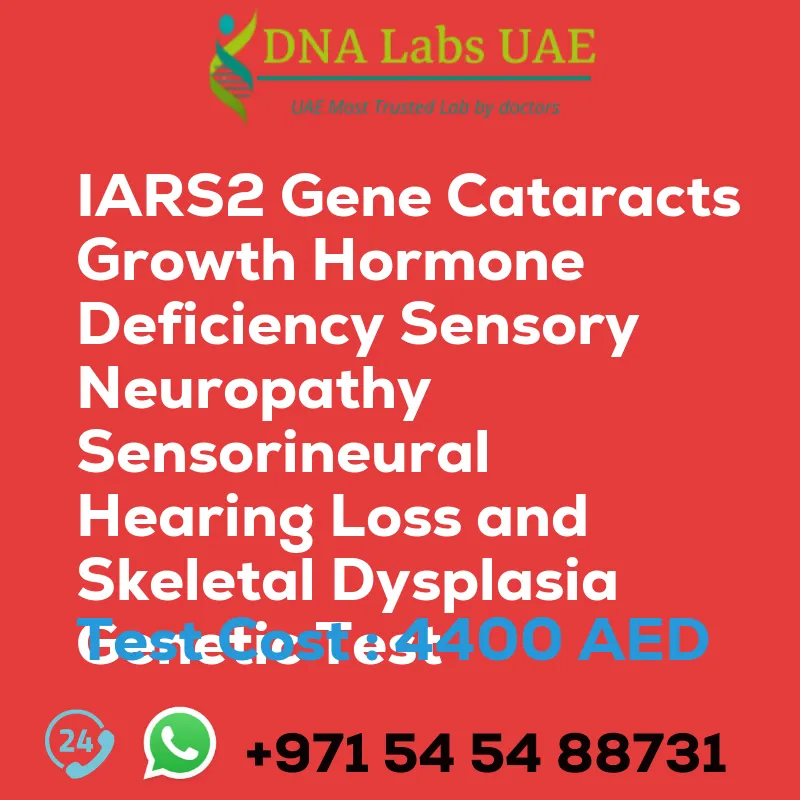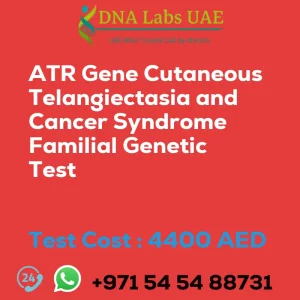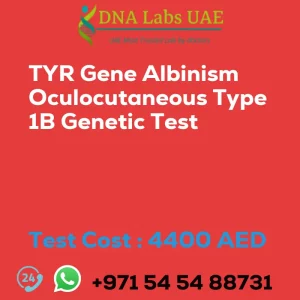IARS2 Gene Cataracts Growth Hormone Deficiency Sensory Neuropathy Sensorineural Hearing Loss and Skeletal Dysplasia Genetic Test
Are you experiencing symptoms such as cataracts, growth hormone deficiency, sensory neuropathy, sensorineural hearing loss, and skeletal dysplasia? If so, you may benefit from the IARS2 Gene Cataracts Growth Hormone Deficiency Sensory Neuropathy Sensorineural Hearing Loss and Skeletal Dysplasia Genetic Test offered by DNA Labs UAE.
Test Details
The IARS2 gene is associated with a variety of clinical features, including cataracts, growth hormone deficiency, sensory neuropathy, sensorineural hearing loss, and skeletal dysplasia. To confirm a suspected genetic cause for these symptoms, a Next-Generation Sequencing (NGS) genetic test can be performed.
NGS is a high-throughput sequencing technology that allows for the simultaneous analysis of multiple genes or even the entire exome (all protein-coding regions of the genome). In the case of suspected IARS2 gene involvement, the NGS test would specifically target and sequence the IARS2 gene.
The test involves obtaining a DNA sample, typically through a blood or saliva sample, and extracting the genomic DNA. This DNA is then processed and prepared for sequencing. The NGS platform reads the DNA sequence and generates vast amounts of data, which is subsequently analyzed and interpreted by bioinformaticians and geneticists.
The analysis of the NGS data involves comparing the patient’s DNA sequence to a reference genome and identifying any variations or mutations in the IARS2 gene. These variations can include single nucleotide variants (SNVs), small insertions or deletions (indels), or larger structural variations.
The identified variants are then evaluated for their potential pathogenicity and relevance to the patient’s clinical symptoms. The NGS genetic test can provide valuable information about the presence of mutations in the IARS2 gene, aiding in confirming a diagnosis and guiding appropriate management and treatment strategies.
Additionally, the test can help identify other affected family members who may be at risk of developing similar symptoms.
Test Components and Price
The IARS2 Gene Cataracts Growth Hormone Deficiency Sensory Neuropathy Sensorineural Hearing Loss and Skeletal Dysplasia Genetic Test is priced at 4400.0 AED.
Sample Condition
The test requires a blood or extracted DNA sample. Alternatively, one drop of blood on an FTA Card can also be used.
Report Delivery
The report for the test is typically delivered within 3 to 4 weeks.
Test Type and Method
The test type for the IARS2 Gene Cataracts Growth Hormone Deficiency Sensory Neuropathy Sensorineural Hearing Loss and Skeletal Dysplasia Genetic Test is Osteology Dermatology Immunology Disorders. The method used is NGS Technology.
Doctor and Test Department
The test is performed by a Dermatologist and falls under the Genetics department.
Pre Test Information
Before undergoing the IARS2 Gene Cataracts Growth Hormone Deficiency Sensory Neuropathy Sensorineural Hearing Loss and Skeletal Dysplasia Genetic Test, it is recommended to provide the clinical history of the patient. Additionally, a Genetic Counselling session is conducted to draw a pedigree chart of family members affected by IARS2 Gene Cataracts, growth hormone deficiency, sensory neuropathy, sensorineural hearing loss, and skeletal dysplasia NGS Genetic DNA Test gene IARS2.
Conclusion
If you are experiencing symptoms related to cataracts, growth hormone deficiency, sensory neuropathy, sensorineural hearing loss, and skeletal dysplasia, the IARS2 Gene Cataracts Growth Hormone Deficiency Sensory Neuropathy Sensorineural Hearing Loss and Skeletal Dysplasia Genetic Test offered by DNA Labs UAE can provide valuable insights into the genetic cause of your symptoms. Consult with a geneticist or genetic counselor to understand the implications of the test results and discuss appropriate medical management options.
| Test Name | IARS2 Gene Cataracts growth hormone deficiency sensory neuropathy sensorineural hearing loss and skeletal dysplasia Genetic Test |
|---|---|
| Components | |
| Price | 4400.0 AED |
| Sample Condition | Blood or Extracted DNA or One drop Blood on FTA Card |
| Report Delivery | 3 to 4 Weeks |
| Method | NGS Technology |
| Test type | Osteology Dermatology Immunology Disorders |
| Doctor | Dermatologist |
| Test Department: | Genetics |
| Pre Test Information | Clinical History of Patient who is going for IARS2 Gene Cataracts, growth hormone deficiency, sensory neuropathy, sensorineural hearing loss, and skeletal dysplasia NGS Genetic DNA Test. A Genetic Counselling session to draw a pedigree chart of family members affected with IARS2 Gene Cataracts, growth hormone deficiency, sensory neuropathy, sensorineural hearing loss, and skeletal dysplasia NGS Genetic DNA Test gene IARS2 |
| Test Details |
The IARS2 gene is associated with a variety of clinical features including cataracts, growth hormone deficiency, sensory neuropathy, sensorineural hearing loss, and skeletal dysplasia. To confirm a suspected genetic cause for these symptoms, a Next-Generation Sequencing (NGS) genetic test can be performed. NGS is a high-throughput sequencing technology that allows for the simultaneous analysis of multiple genes or even the entire exome (all protein-coding regions of the genome). In the case of suspected IARS2 gene involvement, the NGS test would specifically target and sequence the IARS2 gene. The test involves obtaining a DNA sample, typically through a blood or saliva sample, and extracting the genomic DNA. This DNA is then processed and prepared for sequencing. The NGS platform then reads the DNA sequence and generates vast amounts of data, which is subsequently analyzed and interpreted by bioinformaticians and geneticists. The analysis of the NGS data involves comparing the patient’s DNA sequence to a reference genome and identifying any variations or mutations in the IARS2 gene. These variations can include single nucleotide variants (SNVs), small insertions or deletions (indels), or larger structural variations. The identified variants are then evaluated for their potential pathogenicity and relevance to the patient’s clinical symptoms. The NGS genetic test can provide valuable information about the presence of mutations in the IARS2 gene, which can aid in confirming a diagnosis and guiding appropriate management and treatment strategies. It can also help in identifying other affected family members who may be at risk of developing similar symptoms. It is important to note that the interpretation of NGS results requires expertise in genetics and genetic counseling to accurately assess the clinical significance of identified variants. Therefore, it is recommended to consult with a geneticist or genetic counselor to understand the implications of the test results and discuss appropriate medical management options. |








